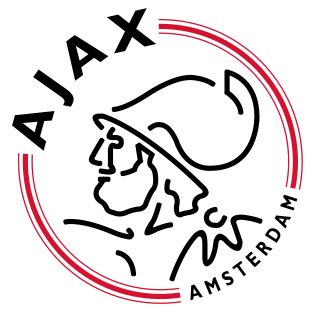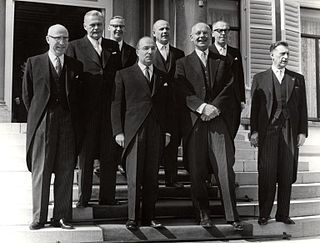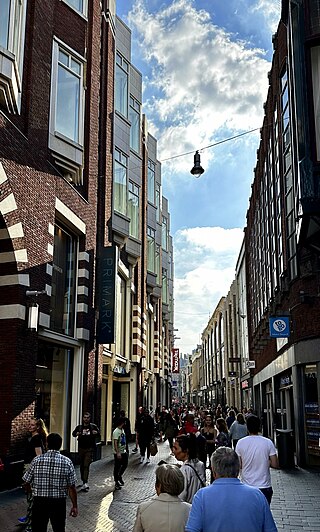
Amsterdamsche Football Club Ajax, also known as AFC Ajax, Ajax Amsterdam, or commonly Ajax, is a Dutch professional football club based in Amsterdam, that plays in the Eredivisie, the top tier in Dutch football. Historically, Ajax is the most successful club in the Netherlands, with 36 Eredivisie titles and 20 KNVB Cups. It has continuously played in the Eredivisie since the league's inception in 1956, and along with Feyenoord and PSV Eindhoven, it is one of the country's "big three" clubs that have dominated that competition.

A cabal is a group of people who are united in some close design, usually to promote their private views or interests in an ideology, a state, or another community, often by intrigue and usually without the knowledge of those who are outside their group. The use of this term usually carries negative connotations of political purpose, conspiracy and secrecy. It can also refer to a secret plot or a clique, or it may be used as a verb.

A hacker is a person skilled in information technology who achieves goals by non-standard means. The term has become associated in popular culture with a security hacker – someone with knowledge of bugs or exploits to break into computer systems and access data which would otherwise be inaccessible to them. In a positive connotation, though, hacking can also be utilized by legitimate figures in legal situations. For example, law enforcement agencies sometimes use hacking techniques to collect evidence on criminals and other malicious actors. This could include using anonymity tools to mask their identities online and pose as criminals.

A subculture is a group of people within a cultural society that differentiates itself from the conservative and standard values to which it belongs, often maintaining some of its founding principles. Subcultures develop their own norms and values regarding cultural, political, and sexual matters. Subcultures are part of society while keeping their specific characteristics intact. Examples of subcultures include BDSM, hippies, hipsters, goths, steampunks, bikers, punks, skinheads, gopnik, hip-hoppers, metalheads, cosplayers, otaku, otherkin, furries, hackers and more. The concept of subcultures was developed in sociology and cultural studies. Subcultures differ from countercultures.

Tourism in the Netherlands is a relatively small sector of the country's economy with a total contribution of 5.4% to gross domestic product and 9.6% to employment. In 2017 the Netherlands was visited by 17 million foreign tourists, making it the 20th most visited country in the world.

Eindhoven Airport is an international airport located 7.6 km (4.7 mi) west of Eindhoven, Netherlands. In terms of the number of served passengers, it is the second largest airport in the Netherlands, with 6.8 million passengers in 2023. The airport is used by both civilian and military traffic.

The homophile movement is a collective term for the main organisations and publications supporting and representing sexual minorities in the 1950s to 1960s around the world. The name comes from the term homophile, which was commonly used by these organisations. At least some of these organisations are considered to have been more cautious than both earlier and later LGBT organisations; in the U.S., the nationwide coalition of homophile groups disbanded after older members clashed with younger members who had become more radical after the Stonewall riots of 1969.

Raggare is a subculture found mostly in Sweden and parts of Norway and Finland, and to a lesser extent in Denmark, Germany, and Austria. Raggare are related to the American greaser and rockabilly subcultures and are known for their love of hot rod cars and 1950s American pop culture. Loosely translated into English, the term is roughly equivalent to the American "greaser", English "rocker", and Australian "Bodgie" and "Widgie" culture; all share a common passion for mid-20th-century American cars, rockabilly-based music and related fashion.

Provo was a Dutch counterculture movement in the mid-1960s that focused on provoking violent responses from authorities using non-violent bait. It was preceded by the nozem movement and followed by the hippie movement. Provo was founded, on 25 May 1965, by Robert Jasper Grootveld, an anti-smoking activist, and the anarchists Roel van Duijn and Rob Stolk. The term was used for the movement as a whole and for individual members. Provo was officially disbanded on 13 May 1967.

Stadion Feijenoord, more commonly known by its nickname De Kuip, is a stadium in Rotterdam, Netherlands. It was completed in 1937. The name is derived from the Feijenoord district in Rotterdam, and from the club with the same name.
The 20th century saw the rise and fall of many subcultures.

The Cals cabinet was the executive branch of the Dutch Government from 14 April 1965 until 22 November 1966. The cabinet was formed by the christian-democratic Catholic People's Party (KVP) and Anti-Revolutionary Party (ARP) and the social-democratic Labour Party (PvdA) after the fall of the previous Cabinet Marijnen. The cabinet was a Centre-left coalition and had a substantial majority in the House of Representatives; prominent Catholic politician Jo Cals, a former Minister of Education, served as Prime Minister. Labour Leader Anne Vondeling served as Deputy Prime Minister and Minister of Finance, Protestant Leader Barend Biesheuvel continued as Deputy Prime Minister, Minister of Agriculture and Fisheries and the responsibility for Suriname and Netherlands Antilles Affairs from previous cabinet.

Emma Eleonora (Esmé) Wiegman-van Meppelen Scheppink is a former Dutch politician. As a member of the ChristianUnion (ChristenUnie) she was an MP from 1 March 2007 to 19 September 2012. She focused on matters of the European Union, public health, welfare, sports, spatial planning and natural environment.
The following is a list of terms specific to anarchists. Anarchism is a political and social movement which advocates voluntary association in opposition to authoritarianism and hierarchy.
Otherkin is a subculture of people who identify as partially or entirely nonhuman. Some otherkin believe their identity derives from non-physical spiritual phenomena, such as having a nonhuman soul or reincarnation. Some otherkin give non-spiritual explanations for themselves, such as unusual psychology or neurodivergence, or as part of Dissociative Identity Disorder or multiplicity. Many otherkin say they are physically human.

Robert Jasper Grootveld was a Dutch artist, best known for his events on the Spui in Amsterdam. Grootveld's 'happenings' were a forerunner of the Provo movement, which he later joined.

Solar power in the Netherlands has an installed capacity of around 23,904 megawatt (MW) of photovoltaics as of the end of 2023. Around 4,304 MW of new capacity was installed during 2023.

Denk, legally registered as Politieke Beweging Denk, is a political party in the Netherlands, founded on a minority rights platform.

The Nieuwendijk is a major shopping street in central Amsterdam. There are some 200 shops along the street. The street, which dates to the early medieval history of Amsterdam, counts 98 buildings with rijksmonument status.

Squatting in the Netherlands is the occupation of unused or derelict buildings or land without the permission of the owner. The modern squatters movement began in the 1960s in the Netherlands. By the 1980s, it had become a powerful anarchist social movement which regularly came into conflict with the state, particularly in Amsterdam with the Vondelstraat and coronation riots.



















